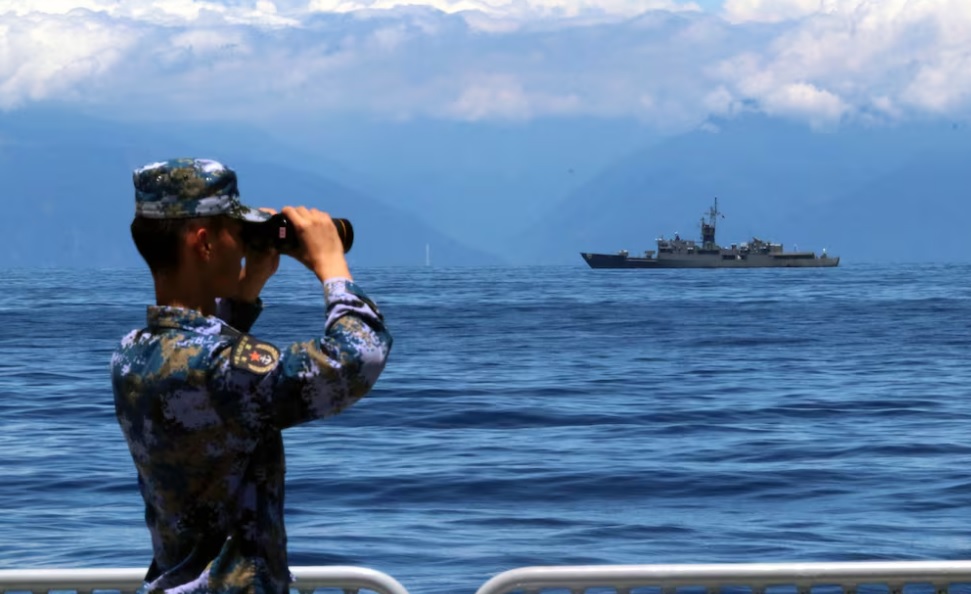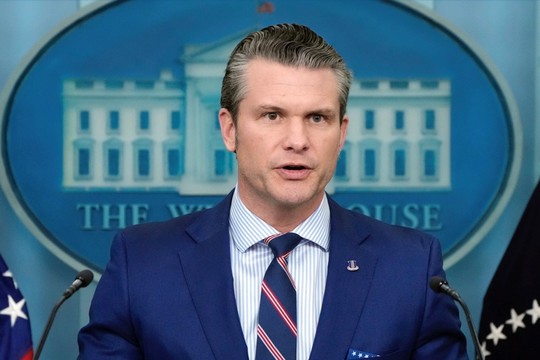Defense Secretary Pete Hegseth
Photo: AP
The Pentagon will “assume risk in other theaters” given personnel and resource constraints, and pressure allies in Europe, the Middle East and East Asia to spend more on defense to take on the bulk of the deterrence role against threats from Russia, North Korea and Iran, according to the guidance, stresses ‘The Washington Post’, reveals an internal guidance memo from Defense Secretary Pete Hegseth.
Defense Secretary Pete Hegseth has reoriented the U.S. military to prioritize deterring China’s seizure of Taiwan and shoring up homeland defense by “assuming risk” in Europe and other parts of the world, according to a secret internal guidance memo.
The document, known as the Interim National Defense Strategic Guidance and marked “secret/no foreign national” in most passages, was distributed throughout the Defense Department in mid-March and signed by Hegseth. It outlines, in broad and sometimes partisan detail, the execution of President Donald Trump’s vision to prepare for and win a potential war against Beijing and defend the United States from threats in the “near abroad,” including Greenland and the Panama Canal.
The first Trump administration and the Biden administration characterized China as the greatest threat to the U.S. and postured the force to prepare for and deter conflict in the Pacific region. But Hegseth’s guidance is extraordinary in its description of the potential invasion of Taiwan as the exclusive animating scenario that must be prioritized over other potential dangers — reorienting the vast U.S. military architecture toward the Indo-Pacific region.
The Pentagon will “assume risk in other theaters” given personnel and resource constraints, and pressure allies in Europe, the Middle East and East Asia to spend more on defense to take on the bulk of the deterrence role against threats from Russia, North Korea and Iran, according to the guidance.
The agency will shift focus to counterterrorism missions against groups with the capability and intent to strike the U.S., the guidance says, signaling that it will deprioritize militants in the Middle East and Africa who are regionally destabilizing but don’t have ambition to launch international attacks.
“China is the Department’s sole pacing threat, and denial of a Chinese fait accompli seizure of Taiwan — while simultaneously defending the U.S. homeland is the Department’s sole pacing scenario,” Hegseth wrote. Its force planning construct — a concept of how the Pentagon will build and resource the armed services to take on perceived threats — will consider conflict only with Beijing when planning contingencies for a major power war, it says, leaving the threat from Moscow largely attended by European allies.
Hegseth recently visited the Pacific region to emphasize his priorities against China, telling service members in Guam that they are “the tip of the spear” for U.S. military operations.
The new Pentagon guidance for a “denial defense” of Taiwan includes increasing the troop presence through submarines, bombers, unmanned ships, and specialty units from the Army and Marine Corps, as well as a greater focus on bombs that destroy reinforced and subterranean targets. The plan also calls for improving defense of U.S. troop locations in the Indo-Pacific, generating pre-positioned stocks and improving logistics.
The guidance also directs military leaders to ensure access to the Panama Canal and take a more assertive role in combating drug trafficking, border protection and deportations, which are normally carried out by the Department of Homeland Security. Those details were previously reported by CNN and NBC News. It also calls for the expansion of U.S. nuclear forces and homeland missile defense through the still conceptual “Golden Dome” described by Trump.
Hegseth’s guidance acknowledges that the U.S. is unlikely to provide substantial, if any, support to Europe in the case of Russian military advances, noting that Washington intends to push NATO allies to take primary defense of the region. The U.S. will support Europe with nuclear deterrence of Russia, and NATO should only count on U.S. forces not required for homeland defense or China deterrence missions, the document says.
A significant increase in Europe sharing its defense burden, the document says, “will also ensure NATO can reliably deter or defeat Russian aggression even if deterrence fails and the United States is already engaged in, or must withhold forces to deter, a primary conflict in another region.”
 A Chinese People's Liberation Army member looks through binoculars during military exercises as Taiwan's frigate Lan Yang is seen in the background.
A Chinese People's Liberation Army member looks through binoculars during military exercises as Taiwan's frigate Lan Yang is seen in the background.
Photo: Xinhua
Since the first term of the US President Donald Trump, the US has identified comprehensive strategic competition with China as an enduring core agenda, regarding China as the principal challenge to its global dominance. This position has been reaffirmed in this secret internal guidance memo, with the latest guidance particularly emphasizing confrontational competition with China, Li Haidong, a professor at China Foreign Affairs University, told the ‘Global Times’.
US's current radical policies contravene its fundamental national and public interests. The US will ultimately realize that forced strategic decoupling with China would incur unbearable repercussions. The final outcome will not be US administration's America First policy, but rather an accelerated decline of the US development, according to Li.
China is not a mirror image of the hegemonic US. The US needs to stop viewing its ties with China from the outdated Cold War perspective, stop containing China in the name of "strategic competition", and stop aiding or abetting "Taiwan independence" in any form, Chinese Foreign Ministry spokesperson Guo Jiakun said during a regular press conference on March 26, in response to media inquiry regarding a report by the US intelligence agencies claiming China remains the top military and cyber threat to the US and Beijing was making "steady but uneven" progress on capabilities it could use to "capture Taiwan."
read more in our Telegram-channel https://t.me/The_International_Affairs

 9:20 31.03.2025 •
9:20 31.03.2025 •























